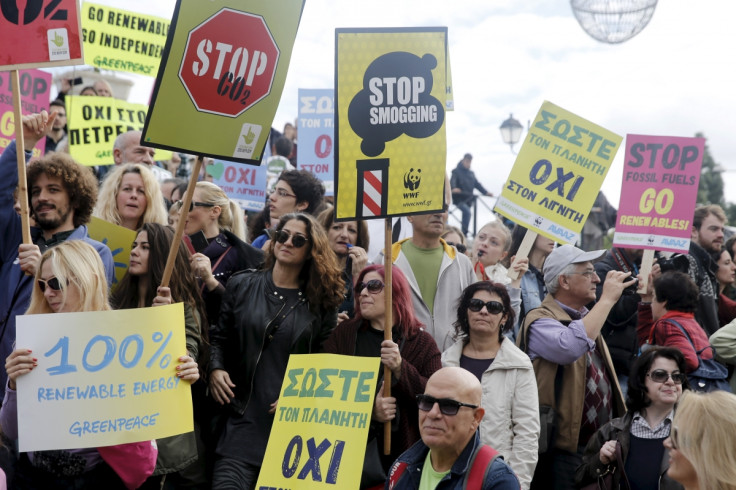COP21: Paris climate talks have failed by letting the rich off the hook

There is more than a week to go before the Paris climate summit ends but it's crystal clear that it will fail to secure serious action on climate change. Unlike the Kyoto Protocol signed in 1997 – an agreement much maligned at the time for not going far enough – there is unlikely to be a legally-binding commitment for rich countries to reduce greenhouse gas emissions.
The deal looks set to be the usual fudge we've unfortunately come to expect from such summits. Even if all parties do decide to honour their word, the pledges announced so far by the major emitters would lead us to warming of between 3-5C by 2100. This may seem an improvement on "business as usual" warming of up to 6C, but even a 3C rise could cost millions of lives and would almost certainly wipe several island nations off the face of the earth.
For us to limit global warming to the internationally recognised limit of 2C (which would still cause serious damage) we need far more ambition than we are likely to see at the Paris summit.
We need to get over the delusion that a bunch of government bureaucrats and corporate lobbyists in a dusty conference centre is going to solve the biggest challenge the human race has seen.
This may all sound like doom and gloom but there is a need for clarity on why we're in this situation. In purely practical terms, it is perfectly realistic for an agreement to be made that is both fair and effective. It is political will that is lacking, particularly among the biggest emitters like the US – a problem that is primarily borne from the huge influence high-carbon industries still have in the corridors of power in these countries.
So what would a "good" Paris deal look like?
The most important part of a truly effective deal would be far more ambitious and legally binding emissions cuts. The US is currently promising to cut net emissions by 26–28% on 2005 levels by 2025. This sounds like more than it is because of an accounting trick. The official base year for emissions is 1990. On this basis, the US pledge adds up to an emissions cut of just 3-9% – almost nothing. A fair climate deal would need the US to cut emissions by at least 55% on 1990 levels by 2025 (or at least 65% on 2005 levels).
The second major element of any deal is climate finance – money to help poorer countries adapt to climate change and build renewable energy systems. Back in 2010, rich countries promised $100bn (£66bn) a year for this by 2020 but very little of this has materialised. A fair climate deal would obligate countries that have used more than their share of the global carbon budget to compensate poorer countries to the tune of at least the $100bn a year previously promised, money that needs to be given as grants, not loans or co-investments by multinational corporations.
These funds need to be channelled to the people who can least afford the economic costs of climate change. This can be done through projects that not only help communities get access to clean energy but give them control and ownership over it. In rural areas, this is usually best achieved though decentralised, community level projects rather than top-down schemes.
A fair deal also needs to recognise that climate change is not a problem caused by governments alone. To see climate change in a purely statist way misses the point. Is a family living on minimum wage in Australia (a high emissions country) more responsible for climate change than an oil executive from Afghanistan (a low emissions country)?
For this reason, a truly fair climate deal would also recognise that many multinational companies are disproportionately responsible for emissions. Mechanisms should be created that penalise the worst corporate emitters and redistribute this wealth to communities seeking environmentally sustainable energy solutions. This will ensure that people everywhere benefit from the green energy revolution.
A good Paris summit would also recognise that the power to shape the transition to a post-fossil fuel world must lie with communities, not negotiators or special interest groups. We need to get over the delusion that a bunch of government bureaucrats and corporate lobbyists in a dusty conference centre is going to solve the biggest challenge the human race has seen.
The real solution must come from the bottom up. It lies in supporting the emerging energy democracy movement at the expense of the polluting industries that cling onto outmoded high-carbon business models. It lies in unlocking the finance to create green jobs and to invest in better renewable technology. And it lies in ensuring that the poorest do not have to pay the price for a problem they did not cause.
Contrary to the nightmare visions purveyed by supporters of inaction, tackling climate change isn't about returning to some neo-medieval existence. It's about harnessing modern technology to transition towards renewable energy sources that, in the longer term, are likely to become so cheap that more people than ever will be able to enjoy the comforts people in the West take for granted.
To achieve this vision, however, the corporate vested interests need to be forced out of the way. That is precisely what is not happening in Paris. But make no mistake, the reason for this is a lack of political will, not a lack of options.
© Copyright IBTimes 2025. All rights reserved.






















